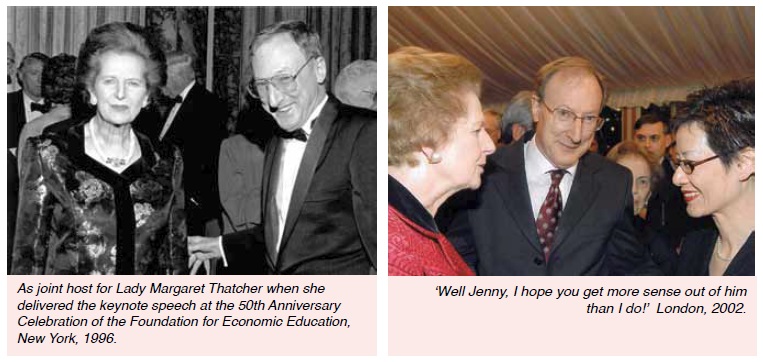Today is the fourth anniversary of Margaret Thatcher’s death and here, Ron shares his memories of meeting the Iron Lady as well as the influences she had on both Britain and himself.
Since the early 1970s I’ve been a regular visitor to England, promoting various mining companies, raising capital and communicating with shareholders. Memories of the first few years were of a steadily decaying civilisation that relied on memories of grandeur but the decay was more obvious to an annual visitor than it was to the locals.
There was garbage on the streets of London, nothing ran on time, the public phones (no mobiles, cell phones then) didn’t work, usually because they were full of coins and nobody had bothered to empty them. Over the years I had also discovered the ‘ideal’ week or two to visit the UK to avoid the unbelievably bad weather and the mass exodus of the business community to Europe for their summer vacation.
Then one year I noticed a difference – there seemed to be a spring in the step of Londoners. Things had stopped ‘getting worse’. Then, after several more visits, it was obvious that the game had changed. Things actually worked, there was a re-emerging British pride. This caused me to ask: “Hey, what’s going on? Where did this new vitality come from?”
The answer was always the same. “It’s that lady, our Prime Minister, Margaret Thatcher. Everything is changing so we all have to change to keep up.” My next question was: “What kind of a woman is this? How is she managing to change the country?”
This helped me build up a profile of the courage it takes to go against the grain, to do what needed to be done, rather than the popular thing. I later felt her pain when a group of her parliamentary colleagues (she called them the “Wets”, I called them the “Wimps”) effectively brought her down, because she continued to make hard decisions (such as keeping the UK out of the Euro currency…and didn’t she get that one right?).
After becoming an avid Thatcher watcher over these many years, you can imagine my delight when I was asked to be a co-host for her as guest speaker at the 50th anniversary dinner of the Foundation for Economic Education Inc. at the Waldorf Astoria Hotel in New York on April 11, 1996.
She came in straight from the airport to the pre-dinner cocktails. Next, after delivering a stunning speech to the assembled leaders of free market think tanks from all over the world, she was then amongst the last to leave the post-dinner party. Not bad — I thought — for a 71 year old. (Her comments to me, that evening, concerning Australia’s former Prime Minister, Malcolm Fraser, could be the subject of another article).
My other personal contact with her was in 2002 in London where Baroness Thatcher addressed our group, The Mont Pelerin Society, at a House of Lords reception then spent several hours mingling with the guests. This was her first public appearance after suffering a severe stroke and, again, I thought: “Not bad — for a 77 year old”. By then my question was, not: “What kind of a woman is it that can change a country, but rather — can change the world?”
Her changes may not have suited or been convenient for everyone, but she saw the need for change and gave the world a vision of what can be achieved if we all start believing in ourselves again. Observing the bad behaviour of the ‘smelly feet’ brigade, currently celebrating the passing of Mrs Thatcher, reminds me of the similar behaviour recently in Melbourne at the IPA/ Rupert Murdoch dinner where those of similar ‘smelly feet’ prevented the entry of the paying guests.
Empathy, I’m told, is the art of appreciating the viewpoint of others, however, it is difficult to avoid wondering why these people don’t follow the abundant opportunities available to them elsewhere. In 1988 I observed youth unemployment of 30 per cent in Scotland’s former shipbuilding regions. They were all waiting for the shipbuilding industry to return.
That industry had moved to other parts of the world, some fifty years before, where ships could be built competitively. That’s just what happens in our globalized world. Similarly, the Thatcher protestors are waiting for sub-economic, deep coal mining to suddenly become economic. They would be amazed to hear what opportunities there are in Australia if only their ‘hard drives’ could be erased in readiness for a fresh start.
